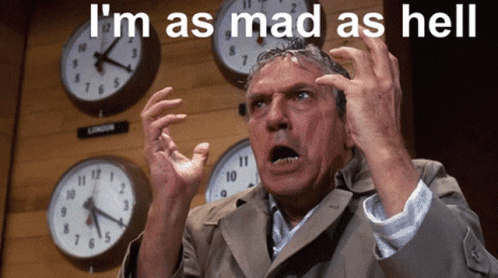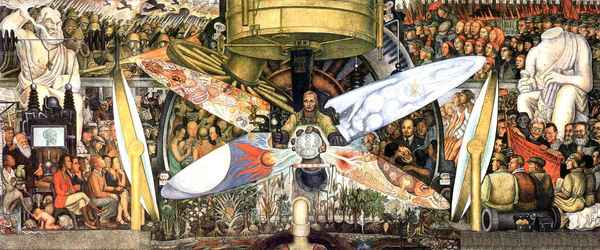Who's to blame? Ranking and allocating responsibility for allowing the next Trump Co. regime (with diagrams where relevant)
Whenever things don't go your way, the instinct is to lay some blame somewhere. Following the re-election of Trump Co., the post-game analysis has been non-stop. Here's my offering on the hierarchy of responsibility.
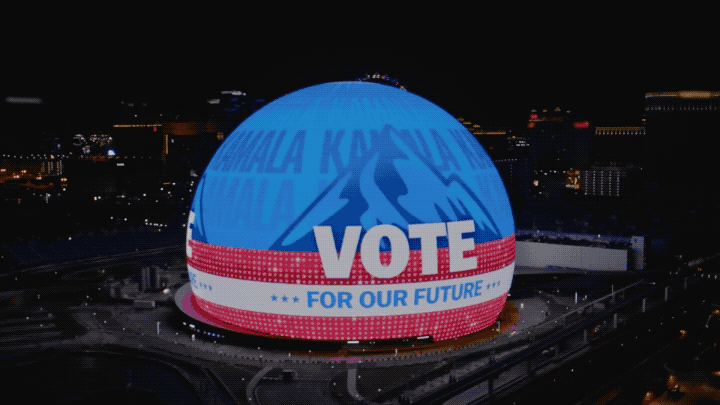
"Attribution is hard," they say. It's the often-repeated mantra in cybersecurity and incident response circles. It's a short catchphrase meant to encompass the myriad challenges a digital forensics team faces when trying to definitively identify the source of a cyber-attack. It's true in anything. Most robberies go unsolved, too, because there is the "burden of proof" that is often tough to establish. When something happens, it's taking place within a dense tapestry of complex systems. "Correlation is not causation" is a similar refrain, emerging from a long history in statistics and scientific thinking. The Latin phrase "cum hoc ergo propter hoc" ("with this, therefore because of this") originated back when the language wasn't dead to point out the ease with which we jump to conclusions about who or what caused anything.
What does all this tell us? That across various disciplines and through the ages, we've accurately observed that we're lousy at laying blame in the right place. You'd think this level of ancient self-awareness would cultivate some kind of reticence against jumping to conclusions. But you'd be wrong. The 'I told you so' market that fuels every OpEd page and blog (such as this one) demands we pin responsibility on something no matter what. History shows that the road to hell is paved with bad takes. Here's mine.
Tl;dr
The post-election analysis about how America re-elected its arguably worst president in U.S. history has been constant. Most analysis points toward the Harris campaign's mistakes about the economy, Biden's unpopularity, influence campaigns, the media. What they miss is the anger. More than anything, anger won the election.
Apologia
You've heard of the slow food movement, right? Welcome to the slow blog variant. I was traveling back from a conference last week, thinking about how I'd wanted to bang out this post the week before, when it was already not terribly close to being relevant to our current timeline. And then another week went by. I bin drafts that have languished in semi-complete status all the time, and a lot has taken place in the intervening period. But during one recent morning's coffee doom-scroll session, I came across the quality gem shown below via this other blog's post.
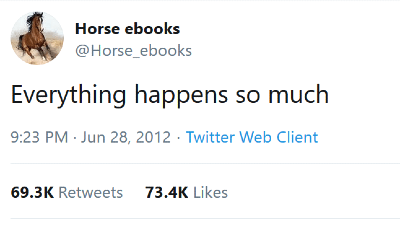
At around the same time, I caught part of a Times Radio interview with people from D.C. think tank The Progressive Policy Institute (PPI) talking about their recently published 2024 election review. Yeah, I have neoliberal talk radio going sometimes on Sundays. The report hits many things (out of the many more things) that the Harris campaign got wrong. But it seems to me that a few weeks on from November 5, most everyone with a platform from which to opine is still not reading the room. They are missing the anger. Both the Democrats and MAGAs (formerly the GOP, formerly the Republicans) ran vibes-based campaigns. Trump Co. read their audiences better. People are mad.
Segue
A co-author of the PPI report is Deborah Mattinson, the former Director of Strategy to UK Labour leader Keir Starmer. The document references in a number of areas that the Democrats have much to learn from Labour's resurrection in the last general election. There are some common elements. It's just unfortunate that the report – while hitting many of the right turn signals on the map — doesn't reach the destination it needs to. It learns all the wrong things. Nearly anyone aside from Jeremy Corbyn could have been running Labour and it would have won. People just had enough of the Tories for the same reason many Americans had enough of Biden. Life is hurting a lot of people. That always hurts an incumbent.
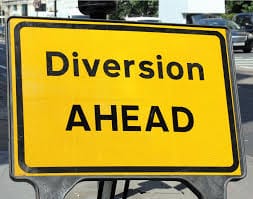
But first we need to talk about Luigi Mangione. Last week a guy we'd all learn way too much about was arrested after having (allegedly!) been able to pull off what so many attempted Trump assassins have failed at: he got his target. He and his photogenic eyebrows stand accused of shooting and killing UnitedHealthcare CEO Brian Thompson.
If America's privatised medical hellscape had a poster child, it would be UnitedHealthcare. The U.S.' largest health insurance company has been in the news for all the reasons America remains famous for being a rich nation that's crap at getting its citizens decent care. CNN has an anthology of the company's record-topping efforts to deny access to medical support for those in need. ProPublica recently reported how the company has been working to limit access to needed treatments for kids with autism The victim in this shooting, Thomson — with a $10 million income last year alone — was facing legal battles over insider trading and fraud. He directly oversaw the company's strategy to deny more claims than any other insurers, and run delay tactics on paying out whenever possible. As we're close to Christmas, he'd be a candidate for this year's Scrooge character, but there were not enough ghosts to visit him in time. Maybe he'll visit the company's new CEO. But probably not.
Meanwhile, a fanbase has emerged around Luigi: Immediately after his arrest, the Pennsylvania McDonald's where Luigi was arrested received a flurry of negative reviews, and in New York, an impromptu look-a-like contest took place down at Washington Square Park. Crowd-funders have raised upwards around $100,000 for his legal defence fund. TikTokers are promoting donations to his prison commissary fund (by going to Jpay, looking up the state of Pennsylvania and his Inmate number: QQ7787). Within hours of his arrest, online shops were full of Luigi merch. You can buy a prayer candle on which he's been canonized (not by the church, obvs.). Cosmo and Vogue have rushed out competing pieces focusing on the thirst trap qualities of the internet's favourite suspected shooter. These are just a taster, Luigi mania is still an ongoing phenomenon.
A concert that was supposed to have a 'Disney theme' got a last-minute cameo from Luigi according to this TikToker.
It's fascinating when the establishment rediscovers class war and identity politics. The New York Times thought it was high time to run one OpEd that misuses statistics and polling results to argue that the health insurance system is working fine, and a companion piece focusing on Luigi's Ivy League education, and family status. This format was taken to a higher art form in the Washington Post, in an attempt to somehow re-cast a multi-millionaire insurance tycoon as just a humble man of the people from Iowa who was struck down by the aristocracy.

The BBC rushed to explain Luigi fandom and downplay his expressed anger at America's creaky health care system and play up the Cult of the Internet doing its thing again. In The Atlantic, one piece warned that "the brazen murder of a CEO in Midtown Manhattan" is the clearest sign that "Decivilization May Already Be Under Way," (never mind all those other shootings in the non-executive class). Another piece in the same magazine worries that, "Mangione may be not a Trumpist or Marxist folk hero but just a male tech worker of a certain age with reasonably common views among his hyper-specific online subculture." Even in their attempts to attribute meaning, the meaning must be trite.
Everyone is missing the anger. Or they don't want to talk about it.

"People don’t cheer for chaos when they feel like justice is possible. But right now, what options do they have? The Supreme Court is corrupt, for many people voting feels useless, and the people in power are funded by the very corporations they’re supposed to regulate. ... Of course, Mangione gets turned into a meme hero—it’s not him they love; it’s the idea of someone finally fighting back. — The Letters from God blog
As mentioned in the last blog post, a lot of people (MAGA voters aside) are trudging through the various stages of grief following the November election in the U.S. and trying to find meaning that somehow conforms to their world views instead of shattering them. It's understanding why people might find some comfort in things like the above linked PPI study (PDF). It gives the appearance of answers and a way forward. The top five listed issues for U.S. voters it found – across the board – were Inflation (46%); Jobs and the economy (45%); and Immigration policy (41%).
No one cares about immigration during the good times, it's a tag-along issue. It gets the blame during the bad times. Their analysis found that 70% of voters wanted either major changes or a complete overhaul of the system, with 59% calling for major changes and 11% believing the entire system needed to be torn down. Only a tiny fraction – 2% – felt the current system was okey dokey salmon smoky. This is in line with global anti-incumbent sentiment. "Voters of the world are sick and tired of whoever's in charge," Derek Thompson wrote earlier this year, and the key beef around the globe during the Year of Elections has also been inflation.
The issue is anger. t is not mentioned once in the PPI study, but you can feel it throughout. "Trump won just under half the popular vote, only 1.6% more than Vice President Kamala Harris received, the study found. "With a public disapproval rating of 50%, he is the least popular presidential winner in modern times." In the U.S. and beyond, many voters are in an anti-incumbent frame of mind. Anything but the status quo is the thing. This is anger. The analysis gets us there, but the report writers draw the wrong conclusions: "It is the kitchen table struggles of working-class families that now need to become the fixation for Democrats, the PPI reported. In the world it depicts, the kitchen table is an awful place. It gets referenced a lot. You start to wonder if people still eat there or just debate economics. Its findings call out “luxury beliefs” that seem to include all the LGBTQ topics, race and gender issues, police brutality, environment or the climate. For a centre-left think tank, there is very little on the left. Only a narrow segment of folks get to have kitchen tables in their view.
I have no doubts that some people believe these concerns exist in a category called “luxury beliefs,” but it's concerning how readily PPI and other centrists want to jump on that bandwagon. For women, trans people, migrants and many minorities or commonly targeted communities, wanting to be safe and have your fundamental rights recognised is not a luxury, it's survival. An inhabitable planet is not a luxury, it's a baseline necessity. The centrists' route is an expedient one for polling, and ultimately a populist approach, one that continually pushes off the hard problems to some future date. What does and doesn't get to be a kitchen table issue is informative. The trap is in what PPI (and I think many centrists) believe we need to learn from all of this. "As Democrats and other centre-left parties try to reconnect with non-college, working-class voters," its authors wrote, "they can draw inspiration from the UK Labour Party’s turnaround under Keir Starmer."
This is nonsense. There is far less evidence that Labour's strategy won the election, and more that the Conservatives lost it due to (in no small part) the cost of living. While Labour won a large majority of MPs, they didn't win by big majorities of voters in many seats. This government could be about as short lived as the Biden administration. Half of Britons are already disappointed by Labour, and only about a quarter think Keir Starmer is doing a good job. There are no honeymoons left in politics. I predict that – given a constant trajectory — UK is due for its next Trumpian moment (Brexit was the last one) by 2029... if not sooner.
The centrist agenda to make more and more topics verboten is to just hand the far-right victories and let it continue to dictate discourse and remove participants in our political processes. Not only does this feed into the far-rights appetite for things to be mad at (because that's an ever-moving target), but it continues to anger and reduce the wedge of progressive and left-wing voters, leaving you with an ever-declining middle who will stick to the dwindling number of acceptable talking points. Anger in politics has strange levers, and it's never just about one thing. "Saying we should focus on the economy is easy, obvious, and usually only a way to obscure a desire to push away positions centrists do not like," Jacob Rosenberg wrote in Mother Jones. "How Democrats focus on the economy is what matters. Taking on inflation by raising interest rates likely will not be popular with voters. Taking on greed might be." That, and so much more.
The blaming phase
The Progressive Policy Institute blames the Harris campaign's lack of focus on non-college, working class folks' kitchen table issues whatever they may be. Got it. Ryan Cooper in American Prospect says the campaign "lost the propaganda war." He makes several good points about the decline of local news, and how the Trump operation made huge gains in the news deserts of critical states around the country. Read that one. The Nation is split on the issue between the cost of living and just old fashioned bigotry (why not both?). There are as many post-election hot takes on what went wrong for the Harris campaign as there are pixels in the Las Vegas Sphere her campaign spent over a half a million dollars to load a gigantic, animated campaign gif onto for a week. New ones still emerge.

Many have good points, some more than others. Most ultimately miss the mark or only contain partial answers. Generally, at a broad, squishy level: There is a lot of political rage in the air. It featured it to such an extent this year that President Biden had to go on television to ask the general public to "cool it down." Two people tried to knock off candidate Trump this election year. They weren't very good at it. While many clocked the mood, they didn't see it as the overwhelming driver it was. A lone gunman has exposed over the course of a week and a half what pundits mostly ignore: Anger. Not over one thing, over many things. All of them, maybe.
One Al Jazeera writer, Belén Fernández, noted it: "And while 'the Trumpers’ anger may have driven this year’s election, there are quite a lot of things to be angry about." That was also a mood that carried over into leftist circles as well. This drove more people who should have been easy Democrat gets to opt out or go for third-party, no-hope tickets. They were votes left on the table.
Simmering and boiling-over anger is not a patent held by the far right. "Occupy Wall Street, Black Lives Matter, the Dakota Access Pipeline protests, #MeToo, the Women’s March, the ceasefire protests, and others were all met with repression, backlash, and often violently oppressed," writes Elad Nehorai in a recent Substack you should subscribe to. "Meanwhile, inequality, racial inequity, misogyny, militarism, and climate change have all worsened. ... A society cannot sustain this level of inequality combined with state repression of nonviolence without some of those who want revolution turning violent. And the longer it continues, the worse and more popular the violence becomes."
We'll return to all that.
The hierarchy of blame distribution
"There is plenty of blame to go around. But for the most part, this finger-pointing will be a distraction, a way of putting off the confrontation with what is coming. Instead, I hope that we can turn our attention to the most vulnerable among us."
— Moira Donegan, who called it in in her day-after assessment
This section is mostly distraction, but most of the "what went wrong" writing since the 5th of November has been as well. And this is the blaming phase of grief, after all. But let's get organised. It's not enough to assign blame, we need to allocate the appropriate amounts of it where it belongs. We need a hierarchy of responsibility. We need a taxonomy. We need a diagram!
A Diagram!

A Diagram Key!!
- The Badness: This needs no further introduction. It's the situation we're now in. It's the coming attack on migrants, the press, political opponents and the press. It's the incoming kleptocracy and regime peopled by the sociopathic and the dim, oriented around greed and fuelled by peddling hatred and division.
- Our Primary Antagonist: Here is our direct causal agent deliberately working toward the adverse outcome (The Badness).
- His Supporting Base: This is the mass participant group enabling the adverse outcome. They won't see it that way, but it's my blog.
- A Compromised Predecessor: Here is an ostensibly allied figure whose actions undermine an already challenged opposition to our primary antagonist.
- The Challenged Opposition: Meet the main force working against our adverse outcome. This one is beset, though, with a series of tactical or strategic failures. (Note: it is not the 'protagonist,' there aren't any. There are just various levels of antagonism all the way down.)
- The Institutional Enablers: These are a couple of power structures that played key roles in facilitating the adverse outcome, either through action or inaction.
- The Zealous Saboteurs: Here is a set of nominal allies to our challenged opposition whose behaviours ultimately damaged their own cause.
- The Splitters: This is a hodge podge of various minor actors whose collective impact further weakened the already challenged opposition and contributed to the adverse outcome.
- The Disengaged Masses: At the lowest wrong on the ladder is a group mainly passive, disengaged or disinterested non-actors whose inaction contributed to the outcome, because there is no opting out.
The Trump Operation
There's a lot of analysis out there of what the Harris campaign got wrong (and it got a lot wrong) but the majority of the blame has to go toward Trump Co. I call it the Trump Operation instead of campaign, because it was more of an Op than a political campaign, with the goal of delivering political power back into the hands of a kleptocracy. Yes, they can be blamed for winning because of what they want to do with that victory. Regardless of whatever else you think went wrong, this is our primary antagonist, the main thing to oppose above anything else. There have been some dark moments in the last four years, but for those who has "how could it be worse?" welp, you're about to find out. Team Trump is already on the job.
When we talk about the Trump Operation, it's inclusive of Elon and various hangers on, it's the whole package that seeks to deregulate, reward sycophants and funders and sycophants and target critics with harassment if not weaponising the system itself to criminalise dissent. The incoming regime plans to attack academic freedom, any adversarial press, or organisations opposed to the new White House's agenda.
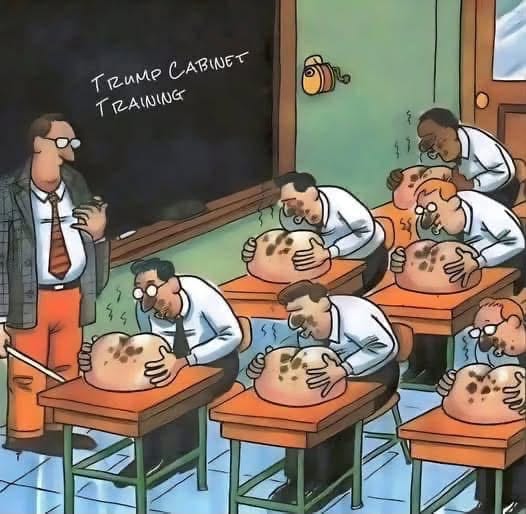
The Trump Operation's strategy was a kind of anger management. The Trump Operation took constant and eager advantage of American anger, weaponising it instead of addressing its underlying causes and concerns, once again turning to highly targeted social platform messaging to go after those either inside or (importantly) outside his support base, and whipping up his loyal followers with a series of vitriolic rallies.
As Belén Fernández wrote in the earlier linked Al Jazeera piece: "To be sure, anger is a convenient antidote to feelings of powerlessness, and Trump is quite capable when it comes to channelling public discontent to his benefit. Xenophobia is an ever-handy weapon in this respect, and so-called 'border security' was a key issue driving this year’s vote – with Trump promising mass deportations and hawking his signature propaganda on the alleged Democratic sponsorship of an invasion of the US by disease-ridden, pet-eating criminal migrant hordes."
Elon is central in the Trump Operation in leveraging anger
It's hard to tell where Trump stops, and where Elon Musk starts in the emerging mechanisms that will constitute next iteration of the Trump regime. What is certain is that Trump's victory can be in no small part attributed to Elon's involvement. He deserves a subheading here, not his own section. Elon is part of the Trump Operation, not a separate entity. It wasn't just the money he spent, but how and where he spent it. Like SpaceX or Tesla, Elon simply bought the experts to make the thing happen. “He stroked a $150 million check for the ground game, which is not sexy, at the exact moment we needed it," Steve Bannon told Puck magazine amid an interview on how he wants to deport 10 million immigrants. "He came in with the money and the professionals. To be brutally frank, it’s the reason we won.”
That amount doesn't include the figure Elon spent to buy Twitter and turn it into his own outsized platform, or some of the other Super-PAC money. All told, the amount he spent is opaque, but he's already playing with the new toy he bought before his president even takes power, personally derailing the annual government funding bill and threatening consequences for any Republicans who compromise with Democrats in Congress. That aside, Elon is taking Bannon machinations global, looking to support far-right political movements in UK and Germany.
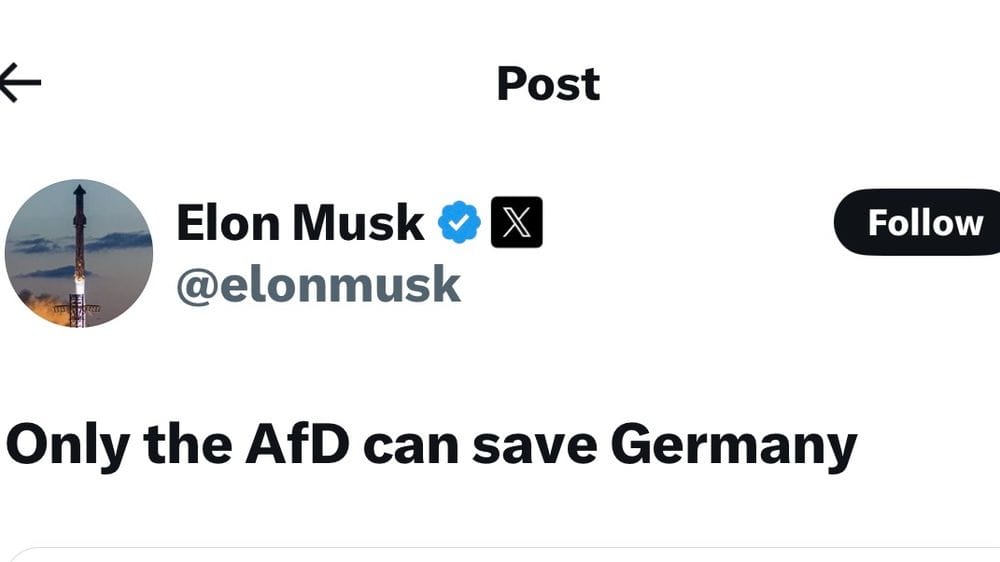
There's an interesting disconnect in how a campaign run nearly exclusively by the billionaire-class for its own benefit can somehow find purchase among more working-class voters in America by vilifying Democratic candidates from working-class backgrounds as "the elite." No logic explains it. Emotion does. Anger does. It explained it in 2016 just as it does now, and it explains the mood internationally, this is not a U.S. phenomenon.
"Look around the world," wrote Polly Toynbee in November. "Everywhere, incumbent governments of every hue have taken a beating from angry voters. For the first time in almost 120 years of records, every government in 10 major countries being tracked by a research project with elections this year suffered an unprecedented reversal."
I wish I could say liberal and progressive political movements would find instruction in all of this, but current events seem to indicate otherwise. The progressive approach would be to address the anger head on, with an aim at fixing its underlying causes. This isn't happening. The far-right approach is a classic time-tested routine: Fix nothing, just stoke it up, and give it something to aim at. This is happening.
All Those Trump Voters
"Quite a few Americans like the idea of strongman rule. And now we have an president-elect who vows to persecute the enemy within, and who has proposed a cabinet that seems designed to overturn a republic."
— Timothy Snyder in The Strongman Fantasy (updated 11/24)
The second most culpable group in our hierarchy of blame is the primary antagonist's base of support: The MAGAs and Trump voters. Their guy one by a fraction of the popular vote, but more crucially took all seven swing states. Everything his administration does now, it's on them. More than any other voting group, they explicitly asked for anything that comes next. They elected a convicted felon who incited an angry mob four years earlier to storm Congress over his last defeat. They voted for a guy a judge has clarified committed sexual assault.
Not every Trump voter supports each thing Trump has promised to do, but they all absolutely know what he plans and rolled the dice on those things they're less keen about.
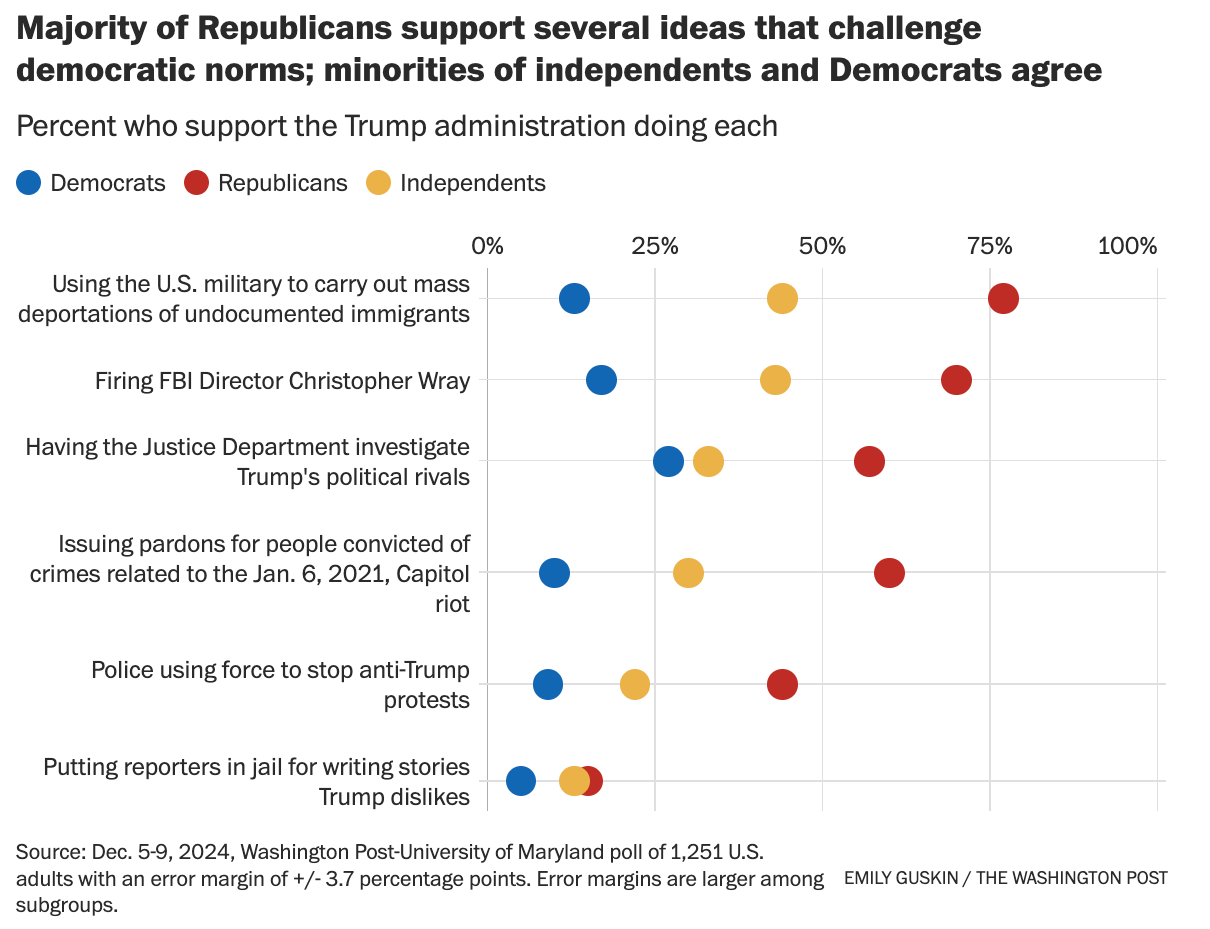
"Trump does seem to have the blessing of a majority of registered Republicans for some of his most divisive ideas, including 77 percent who back his pledge to use the armed forces to carry out mass deportations compared with 42 percent of Americans overall," the above linked WaPo article reports. "Nearly 6 in 10 Republicans say they support the Justice Department investigating Trump’s enemies, whereas fewer than 4 in 10 Americans overall agree." Note that the number drops below 50% for using police against anti-Trump protests and for throwing reporters in jail for doing their jobs, but that didn't stop these people from voting for the guy, which means they aren't too bothered about it.
There's been more coverage of black and Latino Trump voters than the data warrant. By in large, Trump won (largely) on white rage issues. 60% of White men voted for Trump as did 53% of white woman.
"The potential danger they pose to democracy cannot be overstated, writes Bernd Reiter in Salon. "When aggrieved white men construct their identities around a shared sense of loss, they are prone to violence in defense of that identity." During the last Trump term we saw what this looked like: Proud Boys, Oath Keepers, Boogaloo Bois, a 'Patriots Front', and further out there, an "Atomwaffen Division," guys who weren't shy about just being nazis. These are groups that 2024's Trump voters are okay with seeing back on the streets once more.
There may be dim Trump voters but there is no such thing as an uninformed set of them. We know what his regime represents because we saw four years of it already. "Despite obviously belonging to America’s financial super-elite, the billionaire Trump has wooed a wide sector of the domestic working class into viewing him as a saviour from their economic plight in a plutocratic system of which he himself is an integral part," wrote Fernández (yeah, I'm still mining that Al Jazeera story). They knew who they were voting for. There are no valid excuses.
Joe Biden
Biden was supposed to be "bridge" candidate. A seat warmer. There is debate about how explicitly that was planned, but the White House goal starting on day one in 2020 should have been about paving the way for his successor in 2024. I get it, this is common in software development work. You patch a security flaw, and the patch becomes seen as the fix. As our Compromised Predecessor in the blame hierarchy, he lands here because he stoked anger in all of the wrong places for the Democrats and had absolutely nothing to offer for addressing it.
While most Americans were in favour of the U.S. leaving Afghanistan, the chaotic manner in which he abandoned the country was an early reputational hit. That's book-ended with his last years in office doggedly defending U.S. support to Israel's clearly genocidal operation in Gaza. The myth and legend of Biden's supposed foreign policy acumen was shown for the parlour trick it was. No one votes on foreign policy (those of us who think about it a lot are often told) but when you line-item ask people about things like "let the Taliban win" or "support ethnic cleansing" views change.
Biden's uncompromising defence of the administration's economic plan also just sounded worse with every repeat. Interest rates blossomed and with them mortgages became more costly (also driving up rent), credit card debt became more expensive, car payments got more costly, going to the grocery store hurt more, all the real things that most people experience were getting harder to maintain. And there the old guy was banging on about infrastructure. Trust me as someone who tells people how much their servers are going to cost them, no one wants to talk about infrastructure. They need it, they want it to work, they don't want to hear about it. He "failed to address the cost-of-living catastrophe and had little to show for its infrastructure laws, even if it found a lot to talk about," wrote Annie Lowrey. "And it dismissed voters who said they hated the pain they felt every time they had to open their wallet."
Finally, there was just the embarrassment of a leader who would wander off if not monitored, stared blankly into the middle distance and couldn't get key allies' names right. This isn't ageism. Old Bernie Sanders is right over there being loud, getting facts right and name-checking all the things being entirely coherent. And righteously angry.
Biden didn't want to end his campaign, even after that cataclysmic debate with Trump. His refusal to step down divided Democrats and gave fuel to the Trump Operation. That resignation speech of his wasn't a choice, he was pushed out and needed to be pushed out. When the Harris campaign got up and running, it inherited all the anger that Biden had generated. It had to not just prove itself, but dig itself out of the Biden shaped hole, which didn't just include a low national popularity, but in creating splinter groups inside the Democratic party itself like Uncommitted over his continued support of genocide in Gaza. Yeah, I'll include that one again. Harris became a Biden surrogate in many ways and paid the price for it.
The Harris Campaign
We all wanted the Harris campaign to be better than it was. Hope is a treacherous cocoon that has to break open eventually. What is troubling is the lack of Harris' ability to listen to her own campaign's internal polling. While her campaign certainly narrowed the gap with Trump that Biden had caused, it wasn't quite enough.
I knocked a gif of the Las Vegas Sphere at the top of this post because it represents so much of what it got wrong in one go. It was an over-priced spectacle that's big and shiny, conveys very little information, isn't seen by many people and would be off-putting to a number of those who would go by it on their commute to low-paid, irregular hours service sector jobs. It was extravagant bling at a time when many people are struggling to afford the cost of living in part due to Biden Administration decisions.
Harris didn't engage with America's simmering anger. It was paved over with interviews on Oprah or name-checking celebrities. She neither addressed the external frustrations that were driving Trump voters and did nothing really to repair damage within the Democratic party or communities that should have been likely voters. She alienated the left and progressive groups further and played to a centrist group that were never in jeopardy of sitting out the election or voting for anyone else. Instead of using her time to separate herself from an entirely unpopular Biden administration, she chained herself to that anchor and further angered more people. Losing every swing state shouldn't be this easy. Now, here's a listicle:
- Not going to war with Biden: "It's the cost of living, stupid" could have been the new mantra, and it would have gotten a lot of traction. Protecting an old guy's ego by pretending he had a legacy that could be narrated by anyone other than historians hampered everything. Vice presidents are famously not that powerful in an administration. Sharing credit for all of Biden's decisions was itself a choice. A bad one.
- Encouraging an adversarial relationship with the media: Between Trump and Harris, this has been one of the most anti-media campaign seasons. The polarisation had a Venn diagram in which everyone is going to hate on the news. This set a dangerous tone. We needed a pro-Fourth Estate candidate and there wasn't one. This will now be a problem for the next four years at least. She started too late and wasn't prepared.
- Putting Liz Cheney and other conservative old guard types on the stage: No one likes them. Many democrats don't. They fled a Republican party that chased them out. Their endorsements were useful, but only from the back bleachers, as sort of nice curiosities. They brought no significant convert numbers and further alienated others. In a very real way, we have MAGA Republicans because the apparatus they created that allowed it.
- Marginalising anti-genocide voices at the DNC and elsewhere: The Harris campaign didn't handle Gaza well at all and when you have swing state communities where an issue matters trying to argue it away as foreign policy everyone ignores won't work. Palestine is an issue in Michigan, where Trump gained a marginal 9k votes, but Harris lost out on an estimated 22k votes. Key to this was banning Georgia state Rep. Ruwa Romman from speaking at the DNC, which likely would have delivered at least one if not more swing states alone. That, plus Uncommitted being forced into holding a sit-in outside the convention floor dominated the visuals from the conference.
- Bad campaign spending: The campaign raised more than $1 billion but you'd be forgiven for not really seeing its impact on the streets or on the screen. Unless you were in Las Vegas for a week when the big sphere (final reference to that, I promise) was basically a giant animated Harris/Walz campaign gif for something like a half a billion dollars. In Nevada the Harris campaign spent nearly twice as much as the Trump Operation, and yet lost the state. While Elon's super-PAC was spending cash on data-driven disinformation to support Trump, a lot of Harris campaign dollars went to big celebrity events that were not seen by that many people or terribly relevant to most. A political campaign doesn't need to do show business. People have Netflix for that. When it comes to politics, be in their feeds.
Establishment 'Legacy' Media & Big Social
I'm pro-media. I work with news organisations all the time, help journalists with digital safety and information security practices, source protection, etc. I support a number of publishing platforms to stay online as part of the day job. This blog post is full of links to media outlets, some are gift links I get to distribute for having a paid subscription. And between Trump's MAGAs and Harris campaign supporters, the year has had a big 'blame the messenger' vibe. An angry, polarised public is not in much of a mood for an independent press. Across all the most vilified news outlets are some of the world's best journalists. Trump attacked them and Harris tried to avoid them. And in many cases, media owners also just seemed to treat their own publications with distrust.
That doesn't mean that establishment media didn't get it wrong in the aggregate. As James Risen pointed out in The Intercept, "the political press has doubled down on horse-race coverage of the election, overlooking the threat Trump poses to democracy." Trump has long threatened to enact policies that would spell the end of a free press in the U.S. This time around, billionaire owners of the larger publications have stepped in and started to obey in advance. News media concentration into fewer hands is not a new issue. It pre-dates the norm of online-first news publishing by a good couple of decades. It starts mattering when a corrupt regime starts working on its oligarchy. The business model for independent news in the U.S. is broken, but it is around the world as well. The threats as a result are pretty dire.
I'm lumping in Big Social (Meta, TikTok, Twitter/X, etc.) with this group because they all make up what we can fairly call Establishment Media. Facebook is a news publisher regardless of what it wants you to think. People get news off of TikTok. All of these platforms also have exploitable algorithms whether it's to sell sneakers or hatred against migrants. The end goal of Elon's takeover of Twitter is now obvious. On it he killed political discourse and created a loud shouting match where bots, trolls and scammers can pay a subscription fee and run amok.
Social media algorithms are great for keeping people mad. Anger is a scrolling emotion. No significant changes happened with Meta as a result of the Cambridge Analytica scandal or how Facebook algorithms have been used to foster hate (Meta is still fighting claims that it's algorithm helped fuel hate speech that contributed to the Rohingya genocide in Myanmar). Elon and Zuck may have challenged each other into (and out of) having a cage match in public, but it didn't stop, Elon's super-PAC from dumping millions of dollars into Zuck's platforms to push false information for the Trump's election. Meta's abandonment of supporting news fuelled the expansion of information deserts that the Trump Operation (with Elon's help) took over with propaganda.
Like the news publishing industry, Big Social is also broken in its own opposing way. While the news is starved of cash and thrown behind paywalls to survive, social sites are flogging disinformation and getting flush with cash as a result. This will be a problem over the next four years as the new oligarchy — largely tech funded – lines up to pay homage to the incoming Trump regime.
Blue Maga
"So Blue Maga may not be violent or authoritarian like Red Maga, but the consequences of a second major political party in the United States succumbing to a weird online cult of personality could be disastrous for our democracy." – Mehdi Hasan, last July in the Guardian

Remember Bernie Bros? They were a treat compared to Blue Maga. Blue Maga is a kind of entitled and extremely online variant of Democrat anger. Imagine, if you will, if Democratic rage had a personality. It would be part screaming toddler and part annoying customer at Starbucks demanding to see a manager because their latte's oat milk wasn't adequately frothed. I voted for Harris, had a re-occurring donation to the campaign, encouraged people to vote likewise. I enjoyed Tim Walz' Midwest dad-core vibes and videos that mixed campaign rhetoric with auto maintenance tips. The campaign was also the best shot at defeating Trump on offer. That didn't mean it couldn't have been better.
Even suggesting the Harris team might want to appeal to the loads of disengaged and dissatisfied voters it would need would trigger Blue Maga's rage. Suggesting the campaign support human rights was like drowning kittens to them. I'm still on a couple of Bluesky blocklists run by these people. It's good, actually. These are the Zealous Saboteurs. Their damage is limited by their reach, which isn't great, thankfully, but they are extremely online and operate running pile-ons with the aim of just silencing any discourse deemed by the horde to be off message.
Rational behaviour vs. Blue Maga's approach
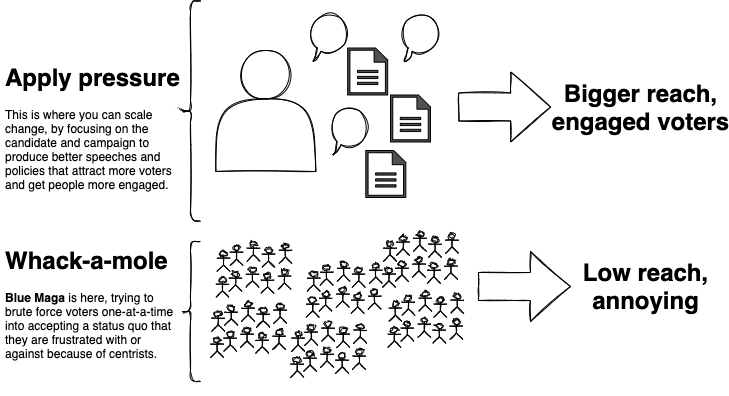
Blue Maga closed off entry points for people who would vote for Harris while also encouraging the campaign to be better. it's zero tolerance for dissent was at odds with the mood of the more general voting public who were weighing up their own reasons for voting for a candidate that in many ways remained unresponsive to their concerns. Blue Maga's message was that their concerns equalled treachery.
Fringe candidates and their supporters
While the Harris campaign didn't reach enough voters, those people didn't necessarily go to Trump. Third parties had a lot more hype as spoilers than was the reality turned out to be in November. In Michigan, Arizona, North Carolina, and Pennsylvania, Jill Stein — the Green party candidate and occasional Assad and Putin defender — was a distant third, too far to show up in the rearview mirrors. Cornell West was even further behind. RFK was a Trump asset to the point that he doesn't even rate in this category. Somehow the weird Libertarian got distant third in Georgia.
American politics is broken, we know this. Third-party candidates are seen as vote stealers. There is no culture of coalition government in the U.S. And there were severe shortcomings in the Harris campaign's promise: Biden continuity, avoidance of tough issues around inflation, an unequivocal defence of its increasingly unpopular support for Israel's unrelenting Gaza demolition project, etc. For a campaign that claimed to be running on hope and optimism, there wasn't much underneath it.
Third parties live on these crumbs of disenchantment. The structure of U.S. politics is such that a third-party fringe candidate can swing things for the worse in many ways. Stein's and West's main fight was for Harris voters, not Trump voters. Their main beef was with Harris' shortcomings not Trump's plan to dismantle the democratic state itself, and in the end their arguments, even if not pulling in big voter turnouts, led to marginal contributions toward the Trump Operation's advantage. Stein's campaign — which European Green parties unsuccessfully lobbied to end — leveraged anger, but there was no outlet for converting it into anything useful. My biggest problem with third parties in the U.S. is that they reveal how rare political acumen really is.
The Disengaged Masses
The 2024 election had a 63.9% percent turnout, just below the 66.6% record turnout from 2020 that had numerology to make some older heavy metal fans happy. But nearly 90 million people didn't vote, which means non-votes were far higher than what either Trump or Harris won. More people voted for no one than anyone, and that's considered a good turnout. This figure isn't new. Year on year, tens of millions of Americans, about two thirds of which bothered to register to vote, don't for president.
I'm against compulsory voting. Some countries have it, the notion gets brought up around every election year. It's inherently undemocratic. Not voting is as democratic of a choice as voting. I'm also against the popular slogan: "if you didn't vote, you can't complain." Of course you can, free speech is a thing. Not voting is itself a complaint. It signifies a resignation or lack of trust in the system as a whole.
The Guardian covered the reasons people didn't vote particularly well this time around. Aside from citing the numbers, the U.S. political reporting class generally doesn't engage with non-voting as a phenomenon, and it's an oversight. Opt-outs are a diverse constituency, more engaged than they get credit for, and probably more representative of the cross-section of American views on the political system than any other group.
"They both hate the poor and serve only their donors," one person is quoted in that article. "The political system in the US is broken," said another. "Things are so polarized, there is no cooperation for the good of the people. There is just so much hate, even in everyday conversation with average people." Not everyone in this group avoided the polls entirely. Many turned up to vote for local or Congressional representatives and just chose to not pick a president.
Of course, there really is no opting out of reality. Every non-vote is an advantage for the candidate in the lead in a narrow race. A key trait of this group is idea that both candidates are essentially the same. There were enough people in this group who would care about women's rights to abortion services, laws protecting free speech and political protest to make a difference on those things and they sat out. Whatever happens next under this incoming Trump regime is also due to them as well. Not choosing is also a choice for something.
A lot is going to happen next, and it's going to happen fast. We may have an adversarial Democratic party that acts like a true opposition, but that's far from a given. "There are other reasons for Democrats to try to take the initiative, wrote Jamelle Bouie in the NYT. "There are still many Americans rightfully concerned with an authoritarian turn in the United States. Again, just over half the electorate did not vote for Trump. They deserve leadership, too. Indeed, the party’s refusal to fight sends ripples through civic life. If Democratic leaders won’t fight, then it’s hard to expect civil society, or just ordinary people, to pick up the slack. Either democracy was on the ballot in November or it wasn’t, and if it was, it makes no political, ethical or strategic sense to act as if we live in normal times."
Either anger was just a vector for inaugurating a kleptocracy with fascist tendencies back in power for the benefit of their rich allies, or it's a national mood that can also be leveraged to remove them as well.
